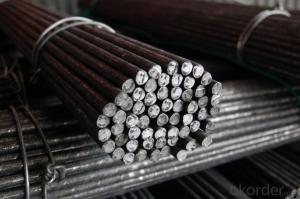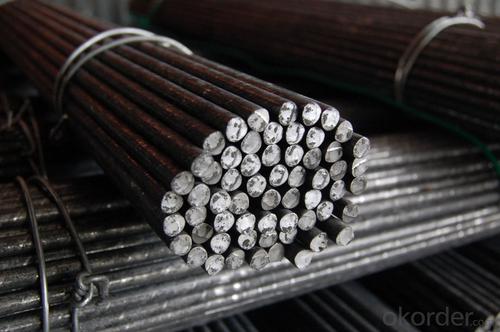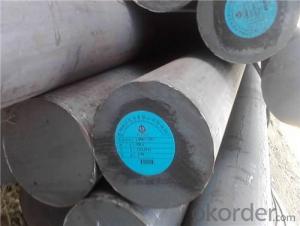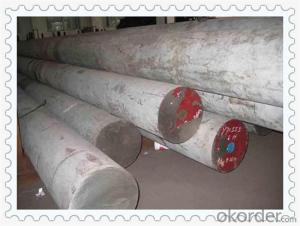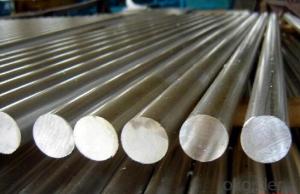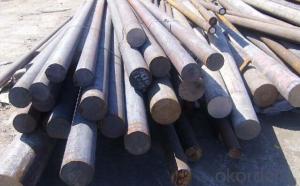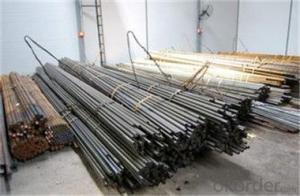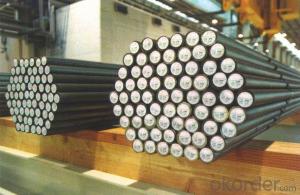Round Bar 42CrMo 4140 Steel of CNBM
- Loading Port:
- Shanghai
- Payment Terms:
- TT OR LC
- Min Order Qty:
- 25 m.t.
- Supply Capability:
- 50000 m.t./month
OKorder Service Pledge
OKorder Financial Service
You Might Also Like
Specification
Round Bar 42CrMo 4140 Steel of CNBM
Product Description:
1. Sizes: Diameter: 16mm-300mm; Length: 6m, 9m, 12m
2. Grade: 42CrMo, 4140,42CrMov
3. Invoicing on theoretical weight or actual weight as customer’s request
4. Shape: Round bar, solid bar of steel with circular section
5. Technique: Hot rolled, forged, cold rolled
Specification:
Material | 42CrMo | Round bar | Dia(mm) | 16-600 |
Process | EAF + LF + VD + Forged + Heat Treatment (optional) | Length (mm) | Max 12000 | |
Heat treatment | Normalized / Annealed / Quenched / tempered | Flat bar | Thickness(mm) | 8-500 |
Delivery condition | Hot forged +Rough machined (black surface after Q/T)+ Turned (optional) | Width(mm) | 70-200 | |
Test | Ultrasonic test according to SEP 1921-84 D/d | Length (mm) | Max 12000 |
Chemical Composition:
C | Si | Mn | Cr | Ni | Cu |
0.38~0.45 | 0.17~0.37 | 0.50~0.80 | 0.9-1.2 | ≤0.030 | ≤0.030 |
Packing and Delivery:
Packing in bundle with steel strips and shipped by break bulk vessel or container (depend on target market and different ports)
Delivery Detail: Approx.45 days
Usage and Applications:
1. Steel round bar is used in a large number of architectural and engineering structures. Or it can be used in construction of plants for the production of steel house frames, high-voltage transmission towers, bridges, vehicles, boilers, containers, ships, etc.
2. And we can use this kind of product on the performance of the mechanical parts if the demand is not very high.
3. Some especial material steel round bar can be used for main shaft of steamer, hummer shank, with big section and supper force.
Product Show:
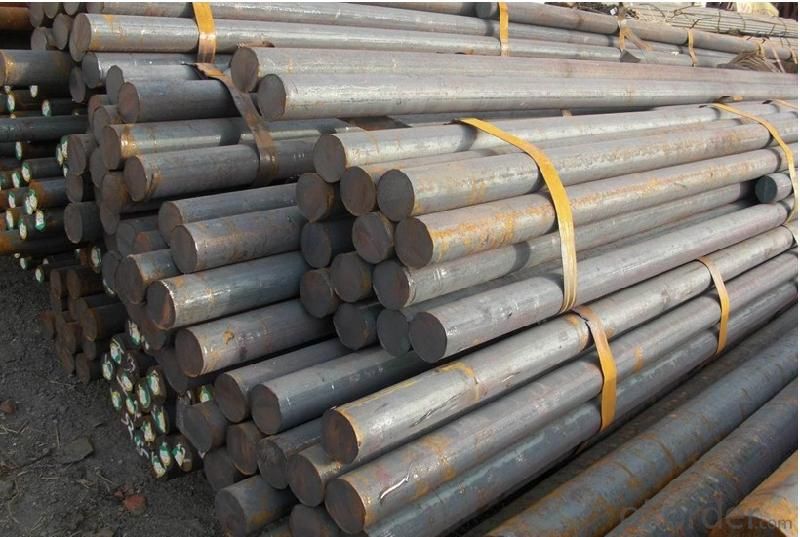
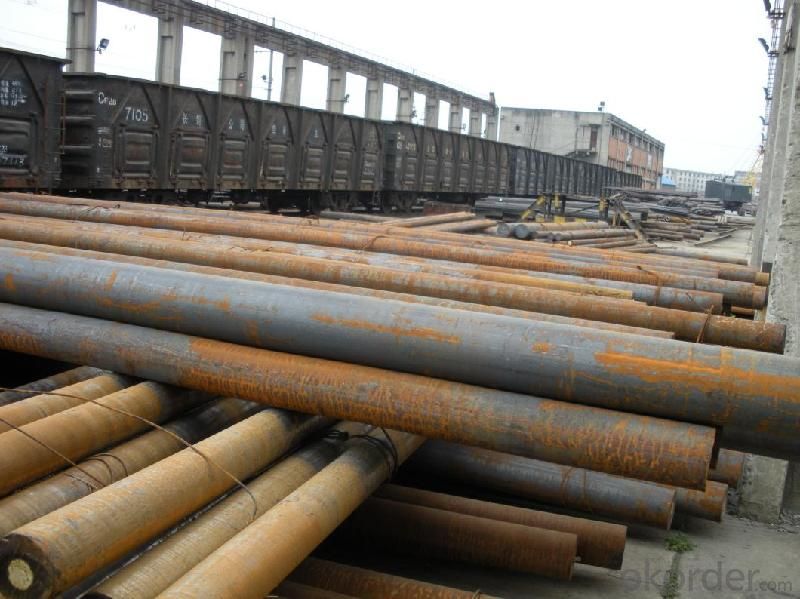
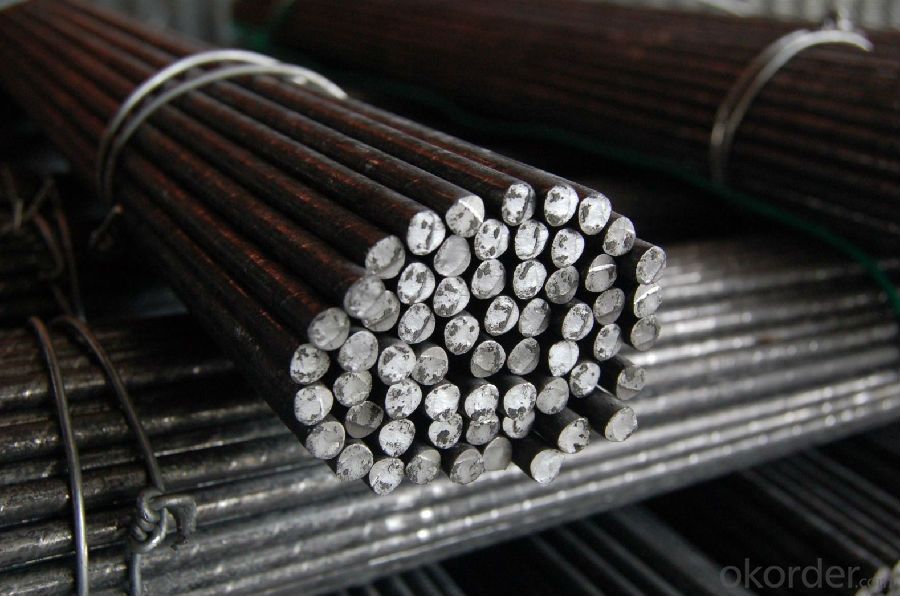
- Q: What are the factors that determine the cost of special steel?
- There are several factors that determine the cost of special steel. These include the raw material costs, manufacturing processes and techniques involved, the complexity of the steel composition, the market demand and supply, and any additional treatments or finishes required. Other factors such as transportation costs, import/export taxes, and industry regulations may also influence the overall cost.
- Q: How does special steel contribute to the construction sector?
- Special steel plays a crucial role in the construction sector by offering a wide range of benefits that contribute to the overall quality, durability, and safety of structures. Firstly, special steel possesses exceptional strength and toughness, making it an ideal material for constructing high-rise buildings, bridges, and other infrastructure projects. Its high tensile strength allows for the creation of lighter and more slender structures, reducing material costs and enabling architects to design innovative and aesthetically pleasing buildings. Moreover, special steel is highly resistant to corrosion, which is particularly important in construction projects located in harsh environments, such as coastal areas or industrial zones. This resistance ensures that structures built with special steel have a longer lifespan and require less maintenance, resulting in significant cost savings over time. Additionally, its resistance to fire and extreme temperatures makes it an essential material for fire-resistant structures and critical components in buildings, ensuring the safety of occupants. Special steel also offers excellent ductility and weldability, allowing for seamless integration with other construction materials and facilitating efficient assembly processes. Its versatility enables it to be used in various structural elements, such as beams, columns, and reinforcement bars, providing stability and structural integrity to buildings, as well as improving seismic performance. Furthermore, the use of special steel in construction aligns with sustainability goals. It is a recyclable material that can be reused without compromising its properties, reducing the environmental impact of the construction sector. Furthermore, its lighter weight compared to traditional materials minimizes the carbon footprint associated with transportation and installation. In summary, special steel contributes significantly to the construction sector by providing strength, durability, fire resistance, corrosion resistance, and versatility. Its use enables the construction of safer, more cost-effective, and environmentally-friendly structures, thereby enhancing the overall quality and sustainability of the built environment.
- Q: How does special steel contribute to the manufacturing of precision components?
- Special steel plays a crucial role in the manufacturing of precision components by offering superior strength, durability, and resistance to wear and corrosion. Its unique properties allow for the production of complex and intricate parts that require high levels of precision and accuracy. Additionally, special steel often exhibits excellent machinability, enabling manufacturers to achieve tight tolerances and fine finishes. Overall, special steel enhances the performance and reliability of precision components, making it an essential material in the manufacturing industry.
- Q: How does special steel contribute to national security?
- National security is significantly enhanced by special steel, which serves various purposes. Firstly, it is extensively utilized in the production of military equipment and weapons. Tanks, armored vehicles, submarines, and aircraft carriers require special steel due to its exceptional strength, resilience, and resistance to corrosion. Incorporating special steel into military applications ensures the durability and reliability of these vital defense systems, ultimately strengthening national security. Secondly, special steel plays a pivotal role in the construction of critical infrastructure. Bridges, tunnels, and buildings, which are essential for a nation's functioning and security, rely on special steel. Its unparalleled strength and ability to withstand extreme conditions make it a crucial material for structures that must endure natural disasters, terrorist attacks, or other security threats. By incorporating special steel into infrastructure projects, a nation can fortify its security and safeguard its citizens. Additionally, special steel is of utmost importance in the energy sector, particularly within nuclear power plants. Special steel alloys are employed in the construction of reactor vessels and other components that encounter high temperatures and pressures. The utilization of special steel ensures the integrity and safety of these critical facilities, mitigating the risk of potential nuclear accidents that could pose significant threats to national security. Lastly, special steel contributes to national security by supporting the defense industry and fostering technological advancements. Research and development in special steel alloys often lead to breakthroughs in material engineering, which can have broader applications beyond defense. These advancements stimulate innovation in sectors such as aerospace, automotive, and energy, thereby augmenting a nation's overall technological capabilities and economic competitiveness. In conclusion, special steel's contribution to national security is multifaceted. Its incorporation in military equipment, critical infrastructure, nuclear power plants, and technological advancements all play a pivotal role in safeguarding a nation's interests, protecting its citizens, and maintaining its strategic advantage in an increasingly turbulent world.
- Q: How does special steel contribute to the medical industry?
- Special steel plays a crucial role in the medical industry by offering a range of desirable properties such as high strength, corrosion resistance, and biocompatibility. It is extensively utilized in the manufacturing of medical devices and surgical instruments, ensuring their durability, precision, and sterility. From implants and prosthetics to surgical tools and equipment, special steel enables advancements in medical treatments, enhancing patient outcomes and improving overall healthcare.
- Q: What are the main factors affecting the creep rupture strength of special steel?
- The main factors affecting the creep rupture strength of special steel are the material composition, grain size, temperature, applied stress, and time.
- Q: What are the main characteristics of structural steel?
- Structural steel is a widely used material in construction due to its exceptional properties and characteristics. The main characteristics of structural steel include: 1. Strength: Structural steel has a high strength-to-weight ratio, making it a durable and reliable material for various construction applications. It can withstand heavy loads and forces without losing its structural integrity. 2. Flexibility: Structural steel offers flexibility in design and construction. It can be easily fabricated into different shapes and sizes to meet specific project requirements. This flexibility allows architects and engineers to create unique and innovative structures. 3. Fire resistance: Steel has excellent fire-resistant properties. It is non-combustible, meaning it does not burn or contribute to the spread of fire. This makes structural steel a safe choice for buildings where fire protection is crucial, such as high-rise structures. 4. Sustainability: Structural steel is a sustainable material as it is highly recyclable. Steel can be reused or repurposed at the end of its lifespan, reducing waste and conserving natural resources. Additionally, steel structures can be designed to be energy-efficient, further contributing to sustainability. 5. Cost-effective: Structural steel offers a cost-effective solution for construction projects. It is readily available, making it more affordable compared to other construction materials. Its strength and durability also result in reduced maintenance and repair costs over the long term. 6. Speed of construction: Steel structures can be fabricated off-site and then quickly erected on-site, leading to faster construction timelines. This reduces project duration and costs, making structural steel an ideal choice for time-sensitive projects. 7. Design versatility: Structural steel allows for a wide range of architectural designs. Its strength and flexibility enable the creation of large, open spaces with minimal support columns, providing architects with design freedom. This versatility makes steel an attractive option for various building types, including commercial, industrial, and institutional structures. In summary, the main characteristics of structural steel include its strength, flexibility, fire resistance, sustainability, cost-effectiveness, speed of construction, and design versatility. These qualities make it a preferred choice for construction projects worldwide.
- Q: What are the main applications of special steel?
- Special steel has a wide range of applications in various industries such as automotive, aerospace, construction, energy, and manufacturing. It is commonly used for the production of high-performance components, tools, and machinery parts that require exceptional strength, durability, and resistance to corrosion and heat. Additionally, special steel is utilized in the production of surgical instruments, cutlery, and various consumer goods that require high-quality materials to ensure reliability and longevity.
- Q: How does special steel contribute to the automotive material recycling?
- Special steel contributes to automotive material recycling in several ways. Firstly, special steel is highly durable and resistant to corrosion, making it ideal for use in various automotive components such as engine parts, chassis, and body structures. This durability ensures that these components have a longer lifespan, reducing the frequency of replacement and consequently reducing waste generation. Additionally, special steel is highly recyclable, meaning that at the end of a vehicle's life cycle, the steel components can be easily and efficiently recycled. The recycling process involves melting down the steel and reusing it to create new steel products, thereby reducing the need for extracting and processing raw materials. Furthermore, the use of special steel in lightweighting initiatives, where lighter materials are used to reduce a vehicle's weight, contributes to fuel efficiency and lower emissions. This is significant for automotive material recycling as lighter vehicles require less energy to operate, resulting in reduced fuel consumption and environmental impact. Overall, the use of special steel in the automotive industry plays a crucial role in promoting sustainability through extended component lifespan, efficient recycling processes, and improved fuel efficiency.
- Q: How does special steel perform in high-wear applications?
- Special steel is specifically designed to withstand high-wear applications due to its exceptional hardness, toughness, and resistance to deformation. It exhibits superior performance by maintaining its shape, strength, and durability even under extreme conditions such as friction, abrasion, and impact. This makes it an ideal choice for industries where wear resistance is crucial, such as automotive, construction, mining, and manufacturing.
Send your message to us
Round Bar 42CrMo 4140 Steel of CNBM
- Loading Port:
- Shanghai
- Payment Terms:
- TT OR LC
- Min Order Qty:
- 25 m.t.
- Supply Capability:
- 50000 m.t./month
OKorder Service Pledge
OKorder Financial Service
Similar products
Hot products
Hot Searches
Related keywords
